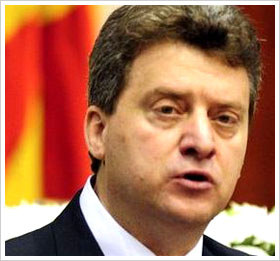EU membership holds key for Macedonian president
 Berlin - Macedonian President Gjorgje Ivanov is confident about the prospect of European Union membership talks after meeting this week in Berlin with German President Horst Koehler.
Berlin - Macedonian President Gjorgje Ivanov is confident about the prospect of European Union membership talks after meeting this week in Berlin with German President Horst Koehler.
Ivanov said his visit came "at a time when our state is expecting a positive report from the EU," and that Macedonia was eagerly awaiting the setting of a date for membership negotiations to begin.
Skopje has drawn hope from recent plans to grant Macedonians visa- free travel to the so-called Schengen zone of countries within the EU by the start of 2010.
"This visit carries a lot of symbolism," Ivanov said in an interview Tuesday with the German Press Agency dpa.
Alongside the 20th anniversary of the fall of the Berlin Wall, the Macedonian president said his country had just celebrated 18 years of independence.
Germany, he said, was a key partner in carrying out the reforms demanded for EU membership.
On his three-day visit, Ivanov met representatives of the German Parliament, government ministries and Berlin Mayor Klaus Wowereit.
Macedonia's ambitions to join the 27-member bloc have been hampered by an ongoing row with Greece over the country's name.
For the last 16 years, Greece has argued that Macedonia could exert territorial claims over its own region of the same name, and as a result has blocked Skopje's EU and NATO memberships.
"The compromise is like a tango," Ivanov said. "To achieve compromises you always need two. We went our way. And now we expect Greece to go its way, and that we find a common point to meet mid- way."
The 49-year-old, who took office in May, said he drew faith from last week's resolution of a long-standing border dispute between Slovenia and Croatia.
"We expect our friends in the EU to point out that Greece should follow the example of Slovenia, so we can start entry negotiations," Ivanov said.
He said Macedonia deserved to be considered for EU entry, as it had proven its resolve and discipline in enacting the necessary reforms.
"We don't want to be given a present or a prize by anybody. We just want to see the result of what we worked for," Ivanov said.
Disappointment at last year's NATO rejection was palpable in Macedonia, he said: "Afterward it came to a depression, to a disappointment and the entire population felt sad and crushed."
Nevertheless, the president said Macedonians bore no aversion to their Greek neighbours.
"Whether you go to the smallest village in Macedonia or stay in Skopje ... people drink the national Greek drink, ouzo, they eat Greek salad and sometimes listen to Greek music," Ivanov said.
He said this came from the fact that Macedonia was itself a multi- ethnic state where people learned to live with their differences.
Nestled in the Balkans between Greece, Albania, Kosovo, Serbia and Bulgaria, has just a population of just 2 million, a third of whom are of Albanian ethnicity.
Macedonia managed to avoid the inter-ethnic violence that erupted during the 1990s in much of former Yugoslavia but faced rebel uprisings in 2001 over demands for greater rights by its Albanian population.
"Macedonia is a multi-ethnic, multi-religious and multi-linguistic country, where democracy works - something that many Western theorists say is not possible," Ivanov said.
Nevertheless, ties are strained with several of Macedonia's neighbours. Bulgaria has accused Skopje of treating badly the country's ethnic Bulgarian population.
The relationship was further threatened by a ferry accident in early September in which 15 Bulgarian citizens died. A further 40 passengers were rescued, thanks in part to the help of passers-by.
On Tuesday, Bulgaria issued passports to thank three Macedonians instrumental in the rescue efforts.
The gesture was bound to irk Macedonia, in view of a Bulgarian policy of offering passports to Macedonians, seen in Skopje as undermining national integrity.
However, Ivanov argued that practical concerns drove people to seek foreign passports, so they could travel or do business abroad in the days when Macedonia was blacklisted.
"The closer January 1 comes, when visa liberalization occurs and Macedonia ends up on the white list for Schengen visas, the less significance there is in having a Bulgarian passport," he said.
"Sure," Ivanov conceded, rounding off the interview, "it's a good gesture for them to receive a reward which can benefit them for a few more months." (dpa)